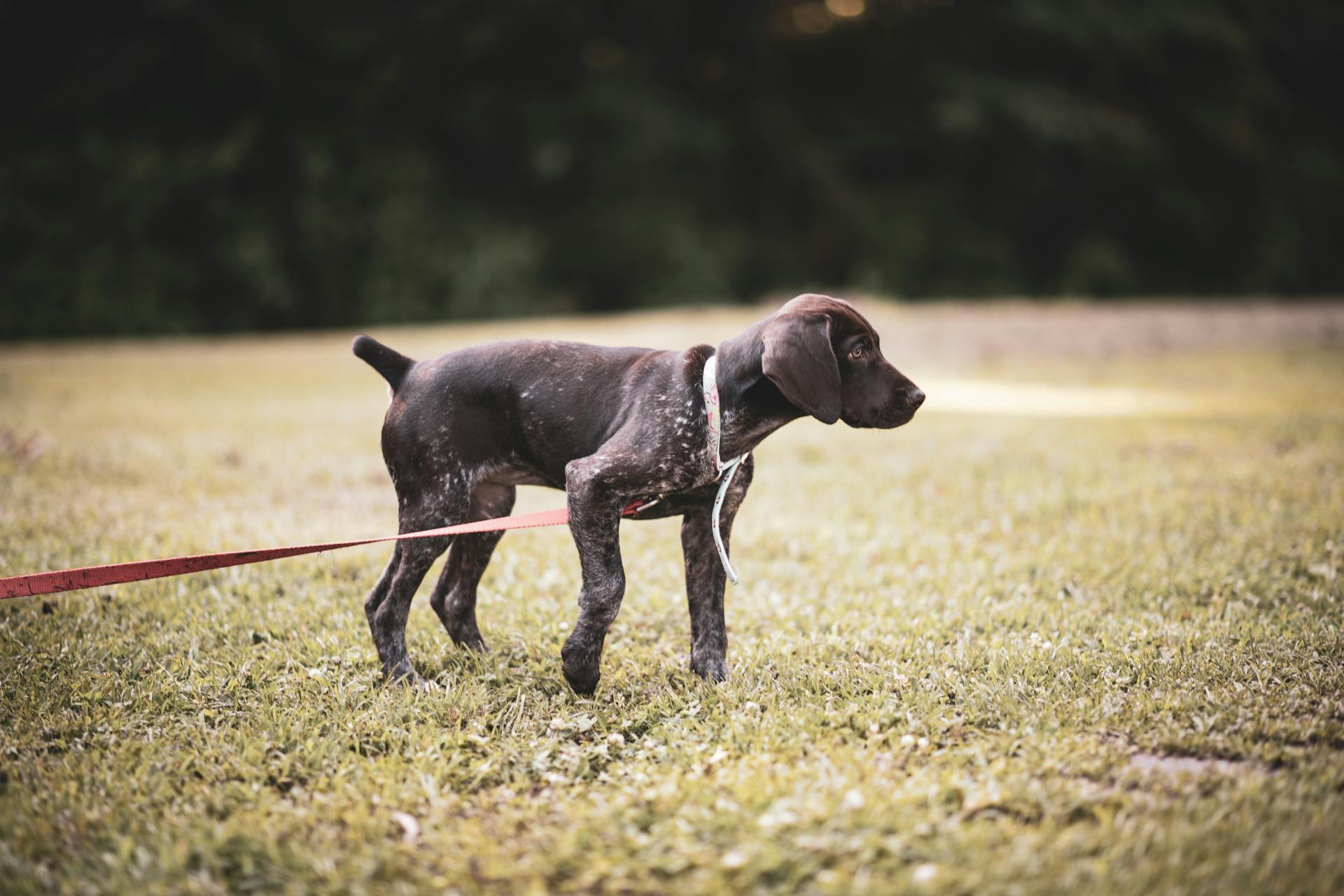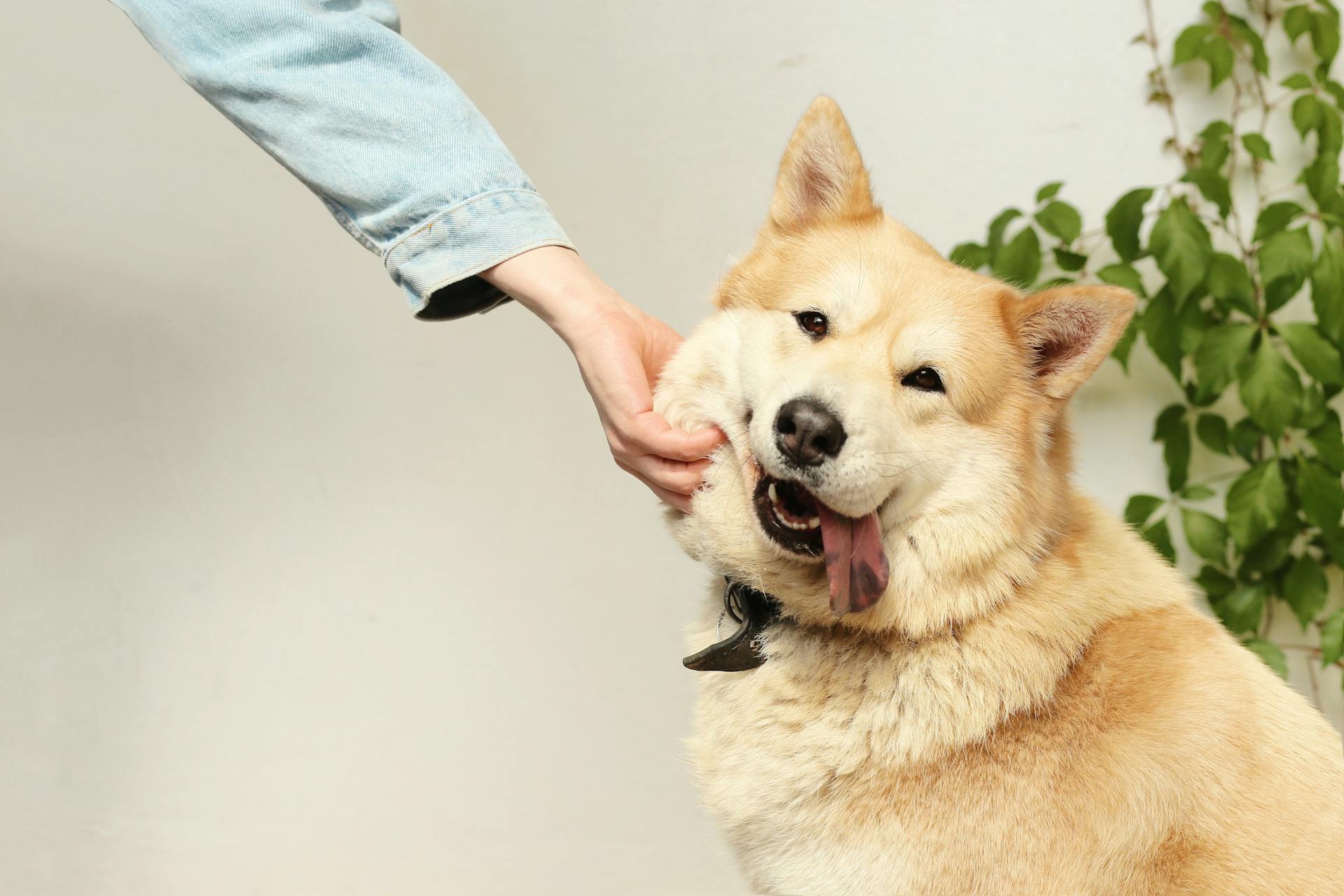
Training a Bernedoodle from puppyhood to adulthood requires patience, consistency, and positive reinforcement.
Start socialization early, ideally from 8 weeks old, to help your Bernedoodle become confident in new environments and around new people.
Housebreaking typically begins around 16 weeks, but be prepared for accidents along the way.
Establishing a routine and clear boundaries is key to successful training.
Discover more: Bernedoodle Breeders New York
Training Methods
There are several ways to potty train a Bernedoodle. You can first do your research and read about it, and then evaluate which method suits you best.
Some potty training methods involve consistency and routine, such as establishing a regular potty schedule and rewarding good behavior.
Positive reinforcement is a key component of successful potty training. This means rewarding your Bernedoodle with treats and praise when they use the potty correctly.
A consistent and patient approach is essential for potty training a Bernedoodle. You'll need to be prepared to spend time and effort on the training process.
You can also consider using a crate to help with potty training, as it can help with accidents and make cleanup easier.
Housebreaking
Housebreaking is a crucial part of Bernedoodle training, and consistency is key. Establish a routine by taking your puppy outside to eliminate at regular intervals, such as after eating, drinking, waking up, or playing.
Use a specific cue word or phrase when your puppy eliminates, as this helps them associate the action with the command. This is essential for effective housetraining.
Positive reinforcement is vital in housebreaking. Reward your puppy with praise and treats when they eliminate outside, and avoid scolding for accidents indoors.
Here are the key steps to effective housetraining:
- Establish a routine: Take your puppy outside to eliminate at regular intervals.
- Use a cue word: Use a specific cue word or phrase when your puppy eliminates.
- Positive reinforcement: Reward your puppy with praise and treats when they eliminate outside.
Remember, patience and consistency are essential when housetraining your Bernedoodle puppy. Accidents will happen, but with a clear plan and positive reinforcement, you can help your puppy learn good habits.
Behavioral Issues
Behavioral Issues are a normal part of the learning process for Bernedoodles, but with patience and consistency, you can address common issues like barking, biting, and leash pulling. These behaviors can often be resolved with proper training and socialization.
Suggestion: Bernedoodle Health Issues
Barking can be a sign of underlying issues such as boredom or anxiety, and early socialization can help prevent fear-based barking. To manage excessive barking, identify the triggers and work on desensitizing your dog to those triggers, teach commands like "quiet" or "enough", and ensure your dog receives sufficient exercise and mental stimulation.
To address biting and mouthing, provide appropriate chew toys for teething puppies and consult with a veterinarian if biting persists in adult dogs. Leash pulling can be reduced with a no-pull harness and consistent training exercises, but be patient as it may take time for your Bernedoodle to learn.
Here are some common behavioral issues and tips to tackle them:
- Barking: Identify triggers, teach "quiet" or "enough" commands, and provide exercise and mental stimulation.
- Biting and mouthing: Provide chew toys and consult a veterinarian if biting persists.
- Leash pulling: Use a no-pull harness and practice loose leash walking with treats and rewards.
Jumping
Jumping is a common enthusiasm-driven behavior in Bernedoodles, especially when they're excited to see their loved ones. They may jump up on people to get attention.
Consistency is key in teaching them that jumping is not acceptable behavior. This means setting clear boundaries and consequences for jumping.
Withdraw your attention by turning away, crossing your arms, or leaving the room to discourage jumping. This helps them understand that jumping doesn't get a reaction.
Worth a look: Bernedoodle Behavior Problems
Barking
Barking can be a common issue for Bernedoodles, and it's essential to identify the underlying cause to address it effectively. Barking can indicate boredom or anxiety.
While Bernedoodles are not typically excessive barkers, barking can be a problem if left unaddressed. Early and thorough socialization can help prevent barking due to fear or unfamiliar situations.
To manage and reduce barking, it's crucial to identify triggers and work on desensitizing your dog to those triggers. This can be achieved by recognizing what causes your dog's barking and gradually exposing them to those stimuli in a controlled manner.
Teaching your dog commands like "quiet" or "enough" can also help control their barking. Consistency is key when training your dog, so make sure to use these commands in various situations to reinforce the behavior.
Physical and mental stimulation can also play a significant role in preventing boredom-related barking. Ensure your dog receives sufficient exercise and mental stimulation to keep them engaged and happy.
Check this out: Bernedoodle Barking
If barking remains a problem, consult a professional trainer for specialized guidance. They can help you develop a customized training plan to address your dog's specific needs and behaviors.
Here are some tips to help you tackle barking:
- Identify Triggers: Determine what triggers your dog's barking and work on desensitizing them to those triggers.
- Training Commands: Teach your dog commands like "quiet" or "enough" to control their barking.
- Physical and Mental Stimulation: Ensure your dog receives sufficient exercise and mental stimulation to prevent boredom-related barking.
- Consult a Trainer: If barking remains a problem, consult a professional trainer for specialized guidance.
Remember, each dog is unique, and training methods may need to be tailored to your dog's individual personality and needs.
Digging
Digging can be a problem for Bernedoodles due to their intelligence and tendency to get bored if not mentally stimulated.
Providing alternative activities and toys can redirect their attention and prevent digging.
Designating a specific area for digging can help prevent damage to your garden.
Advanced Training
Bernerpoodles can start their training as early as 8 weeks old, just like Poodles, making them highly responsive to commands.
Housebreaking requires patience and consistency, as Bernedoodles can be prone to accidents if not trained properly.
Positive reinforcement techniques work best for Bernedoodles, as they thrive on praise and rewards.
You might like: Bernedoodles and Goldendoodles
With regular training sessions, Bernedoodles can learn to walk on a leash without pulling, a skill that's essential for daily walks.
Early socialization is crucial for Bernedoodles, as they can be wary of strangers and new environments if not exposed to them at a young age.
Training sessions should be short and fun for Bernedoodles, as their attention span is relatively short compared to other breeds.
By using high-value treats and toys, you can keep your Bernedoodle engaged and motivated during training sessions.
Consistency and clear communication are key to successful training with Bernedoodles, as they can pick up on subtle cues and body language.
Puppy Development
You can start potty training your Bernedoodle puppy as soon as you bring it home, ideally in a small room or crate to help with training. The earlier you start, the better.
Their developing bladder means they can't hold their urine for long, so it's essential to take them out frequently to relieve themselves. You'll need to be up to take your puppy out of the crate to prevent accidents.
If this caught your attention, see: Potty Training Dog Crate
Bernedoodle puppies are intelligent and lovable, but they require proper training to become well-behaved and well-adjusted family members. With the right training, you'll raise a happy and obedient canine companion.
Training starts from the moment you bring your puppy home, and early training is crucial to develop good habits and manners. This is why it's essential to begin training as soon as possible.
As your Bernedoodle puppy matures into an adolescent and eventually an adult dog, training should continue to address their changing needs and behaviors. This will ensure a smooth transition and prevent any potential issues.
Care and Management
As your Bernedoodle puppy matures, their training needs will change. They'll require ongoing education to address their evolving behaviors and needs.
Continue training your Bernedoodle puppy as they grow, taking into account their changing physical and mental abilities. This will help prevent unwanted behaviors from developing.
As your Bernedoodle matures into an adolescent and eventually an adult dog, training should focus on addressing their specific needs and behaviors, such as socialization and obedience.
How to Care for Your Growing Puppies
As your Bernedoodle puppy grows, it's essential to continue training to address their changing needs and behaviors. You should use healthy, low-calorie treats as rewards during training sessions, opting for treats suitable for your Bernedoodle's dietary needs.
To effectively train your Bernedoodle, you'll need a few necessary items. These include a collar or harness, leash, and crate. A harness is recommended for Bernedoodles, particularly if they tend to pull.
You should start potty training your Bernedoodle puppy immediately after bringing them home. They can't hold their urine for a long time due to their developing bladder. Before picking up your new puppy, decide which part of the house it will be staying in.
A crate can be helpful in potty training, as it provides a safe and secure space for your puppy to relieve themselves. You'll need to take your puppy out of the crate regularly to prevent accidents.
To raise a happy and obedient Bernedoodle, you'll need to provide proper training essentials. This includes using positive reinforcement techniques, such as treats and praise, to encourage good behavior.
A fresh viewpoint: Crate Training during the Day
Here are some essential training equipment you'll need:
- Treats – Use healthy, low-calorie treats as rewards during training sessions.
- Toys – Incorporate fun toys as rewards to keep your Bernedoodle engaged during training.
- Collar or harness – Invest in a good quality collar or harness for outdoor training.
- Leash – A sturdy leash is essential for walks and outdoor training sessions.
- Crate – Consider crate training your Bernedoodle to provide them with a safe and secure space.
Remember, early training is crucial to ensure your puppy develops good habits and manners. By providing the right training and care, you'll be well on your way to raising a well-behaved and well-adjusted Bernedoodle companion.
Nighttime Routine
Place your puppy's crate in your bedroom at night to allow them to feel close to you and provide comfort during the night. This simple step can make a big difference in your puppy's ability to settle down and sleep.
You may need to sleep near the crate initially to reassure your puppy. Gradually move farther away from the crate each night until your puppy is comfortable sleeping alone.
Here's a quick rundown of what you can expect during the first few weeks of nighttime crate training:
- Final bathroom break before bed
- Quiet playtime to calm your puppy down
- Soothing bedtime phrase like "goodnight"
- Midnight potty break (be prepared for this!)
Common Challenges
As you embark on the journey of training your Bernedoodle, you may encounter some common challenges along the way. Accidents in the crate can be a sign that the crate is too large or your puppy was left inside for too long.
A unique perspective: Crate Training 101
To avoid this issue, ensure the crate size is appropriate for your puppy and adjust the schedule accordingly. This will help prevent accidents in the crate.
Destructive behavior, such as chewing or scratching the crate, can be a sign of anxiety or boredom. Providing appropriate toys and ensuring your puppy gets enough exercise and mental stimulation can help alleviate this issue.
Some Bernedoodles may exhibit fear or anxiety when near the crate, requiring a slow reintroduction to the crate with positive reinforcement. This can help create a positive association with the crate.
Excessive whining or crying can be challenging, but sticking to the training process and avoiding giving in to your puppy's demands can help decrease the whining over time.
A unique perspective: Dog Anxiety Training
Choosing a Method
Choosing a method for potty training your Bernedoodle is crucial for success. There are several ways to potty train a Bernedoodle, so it's essential to do your research and read about them.
You can evaluate which method suits you best by considering your lifestyle, living situation, and your Bernedoodle's personality.
What Are Popular Methods?
Choosing a method for training your Bernedoodle can be a bit overwhelming, but don't worry, I've got you covered.
Positive reinforcement training is a great place to start. Experts recommend this method as it focuses on rewarding good behavior rather than punishing bad behavior.
Clicker training is another popular method that uses a small device that makes a distinct sound to mark good behavior. It's a fun and engaging way to train your Bernedoodle.
Housebreaking can be a challenge, but consistency and patience are key. Experts recommend establishing a routine and rewarding your Bernedoodle for using the bathroom outside.
Socialization is an essential part of training your Bernedoodle. Experts recommend exposing your dog to new people, places, and experiences from an early age to help them become confident and well-adjusted.
Choosing the Right Method for Your Dog
Choosing the right method for your dog is a crucial step in their training. There are several ways to potty train a Bernedoodle, so do your research and read about them.
You'll want to evaluate which method suits you best. After all, there are plenty of ways to kill a chicken, and you don't want to try every method out there.
Experts recommend four commonly used training techniques for Bernedoodles. These include positive reinforcement, consistency, and patience.
To choose the right method, consider your lifestyle and your dog's personality. If you have a busy schedule, a method that requires less time and attention might be best. If you're willing to invest time and effort, a more intensive method could be a good fit.
Here are some popular training methods for Bernedoodles:
- Positive reinforcement: Reward your dog with treats and praise when they behave well.
- Consistency: Establish a routine for feeding, bathroom breaks, and training.
- Patience: Allow your dog to learn at their own pace and don't rush the process.
- Clicker training: Use a clicker to mark good behavior and reward your dog with treats.
Frequently Asked Questions
How do you discipline a Bernedoodle puppy?
To discipline a Bernedoodle puppy, use positive reinforcement techniques such as rewarding good behavior and ignoring bad behavior, rather than punishment or yelling. Consistency and patience are key when teaching your puppy good manners and housebreaking skills.
Do Bernedoodles ever calm down?
Bernedoodles may not necessarily calm down completely, but regular exercise can help them learn to manage their energy levels over time. Their calmness level depends on individual factors and exercise habits.
Are mini Bernedoodles easy to train?
Yes, mini Bernedoodles are highly trainable due to their intelligent and curious nature. They thrive on learning new things and can easily pick up agility, obedience, and other tasks with positive reinforcement.
What to expect with a mini Bernedoodle puppy?
Mini Bernedoodle puppies are friendly, active, and playful companions that thrive with early training and attention. With proper care, they become lifelong friends that bring love and joy to families
Sources
- https://centralillinoisdoodles.com/blog/are-bernedoodles-easy-to-train-training-insights-and-tips/
- https://www.wisconsindesignerdoodles.com/stokeshire-doodle-puppy-blog/bernedoodle-potty-training
- https://arrowtpets.com/bernedoodle-training-essentials-from-puppy-to-adult/
- https://arrowtpets.com/how-to-crate-train-your-bernedoodle-puppy/
- https://www.prideandprejudoodles.com/bernedoodles-vs-goldendoodles-similarities-differences/
Featured Images: pexels.com


